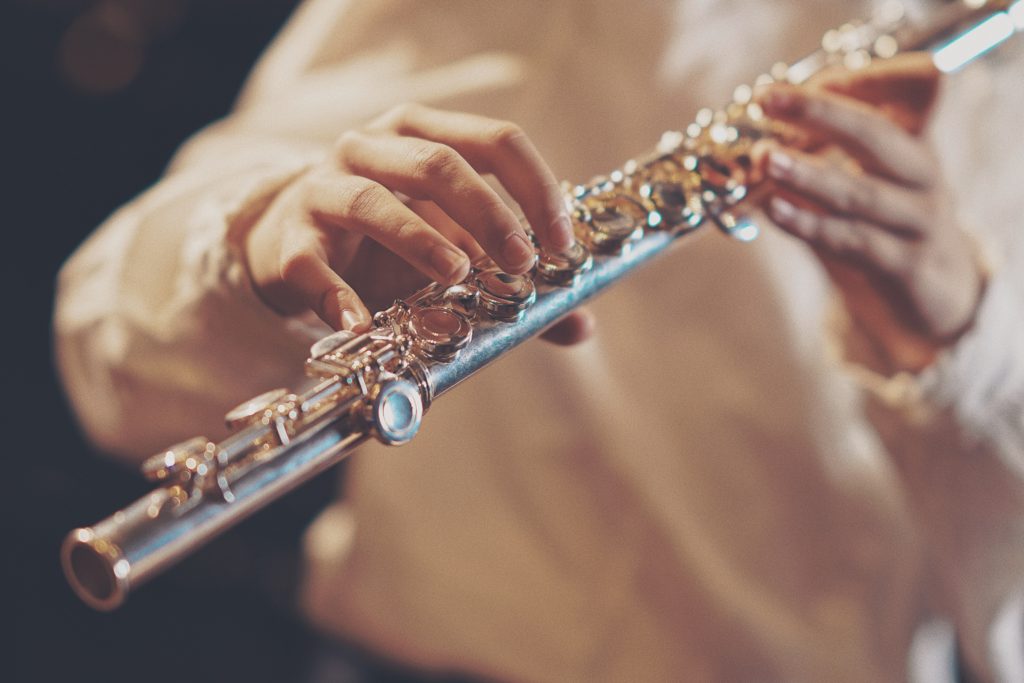
This is one for the teachers out there. Just what should you cover in that very first flute lesson? This is a tricky one as you want the student to go away feeling fulfilled and motivated to attend the next lesson but you also want to build a foundation from which their later technique can be built. The first lesson is such an important point in a new student’s life and very well could be the start of a new amazing adventure!
Firstly, you want to go through in your head the elements that make a great player. Here is my list:
- Strong sound
- Solid finger technique
- Listening skills
- And above all a passion for music
How can we enhance all of these skills in the first lesson?
Firstly, don’t put pressure on yourself to achieve everything in this first flute lesson. Most students will be very happy if they go away knowing they can make a sound and hold the instrument! And in some cases’, this is all you will have time to get through.
In the first lesson, get to know your pupil. Knowing their personality a little better will allow you to tailor this first lesson. You might come to realise that all they really want is to produce a sound. Or they might want to go away being able to play a short piece. Make sure that pupils have an idea how long it will take them to achieve more.
It would help to make sure you get as much information as possible before this initial lesson. Although this form won’t give you the whole story it will certainly give you a great place to start.
Here is a list of five things you should aim to achieve in that very first lesson:
- Create a sound on the head joint – no matter how big or small! Celebrate every achievement! Some students may take several lessons to produce a consistently strong sound but keep the encouraging words coming.
- Teach your student how to safely put the flute together. Even if you don’t learn any notes today, you know they will go away being able to put the flute together. They willdo this anyway, so it is best that they can do this safely!
- Introduce the idea of music being a language that we read on paper. Cover what a crotchet (half note) is and begin to clap simple rhythms. This will show them that with hard work they will be able to play anything they want, just by reading the notes on the paper.
- Listen to a flute player, this could be simply you playing a piece to a student! It is important to know what they are aiming for.
During this first lesson you should always play the students flute to ensure that there is nothing wrong with it. A lot of frustration can be caused simply by a flute that has a dodgy mechanism, a cork that is not fitted properly or simply something stuck in it! Ensure that the equipment works well!
If the student has not yet bought their flute, then it is important to recommend a good instrument, see my article on good choices for beginner flutes here.
Be sure to keep notes so that your second lesson is even more focused than this initial one. The first lesson will always be a little bit of give and take. Until you know the personality and learning style of your new pupil it will be hard to plan a completely tailored lesson.
Always communicate with the parents if it is a child, or ensure you write down in a notebook or email for an adult, to ensure that everyone is well informed and on the same page. It is vital that you have parents support. This will not only make your life easier when trying to encourage your student to practise, but it will mean that if your student’s enthusiasm wanes (which it will – take yourself back to when you first started!) the parents will be right there with you keeping them going. I always drop parents regular update emails if I don’t see them regularly as well. For me this creates a regular dialogue, which I find so important, and allows parents to ask you any questions at ease.
Do remember that if you feel the flute is not for the student, or your personalities clash, recommend them to another teacher or another instrument. Passing on a passion for music is the main aim and if a student doesn’t seem to have a natural flare then don’t be afraid to say so. Parents will appreciate your honesty!
Let me know how you get on!
Have a great week and check out my other blog posts here!
Jade x
